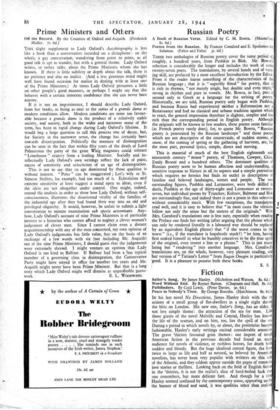Prime Ministers and Others
THIS slight supplement to Lady Oxford's Autobiography is less like a book than a conversation recorded on a dictaphone : on the whole, a gay conversation, wandering from point to point, as all good talk is apt to wander, but with a general theme. Lady Oxford writes, or rather talks, about the Prime Ministers whom she has known. If there is little subtlety or depth about the talk, there is no pretence and also no malice. (And a less generous mind might well have found occasion for malice in dealing with at least one of. the Prime Ministers.) At times Lady Oxford presumes a little on other people's good manners, or perhaps I might say that 'she behaves with a certain innocent confidence that she can never bore anyone.
If it is not an impertinence, I should describe Lady Oxford, from her books, as being as near to the status of a grande dame as modern conditions allow. Modern conditions are none too favour- able because a grande dame is the product of a relatively stable society, and society, both in the wider and narrower sense of the term, has been in rapid change during Lady Oxford's lifetime. It would beg a large question to call this process one of decay, but, for Society in the narrower sense, the change has certainly been towards disintegration. Politically the measure of disintegration can be seen in the fact that within fifty years of the death of Lord Palmerston the party of the great Whig magnates could tolerate " Limehouse " oratory from a leading Minister. Socially and in- tellectually Lady Oxford's own writings reflect the lack of poise, excess of sensitivity and eclecticism of an age of disintegration.
This is not to say that an age dominated by those qualities is without interest. " Poise " can be exaggerated ; Lot's wife or St. Simeon Stylites, for example, had too much of it. Eclecticism and extreme sensitivity at least suggest a mind open to ideas, even if the ideas are not altogether under control. One might, indeed, extend the analysis in order to show how Lady Oxford, without self- consciousness, illustrates the disoriented vitality of the families of the industrial age after they had found their way into an old and privileged oligarchy. It would, however, be unfair to submit a light conversation to minute examination sub specie aeternitatis. Any- how, Lady Oxford's account of nine Prime Ministers is of particular interest to a historian who cannot afford to neglect ,a clever woman's judgement of clever men. Since I cannot claim even a distant acquaintanceship with any of the men concerned, my own opinion of Lady Oxford's judgements has little value, but: on the basis of an exchange of a few words with six (not including Mr. Asquith) out of the nine Prime. Ministers, I should guess that the judgements were extremely shrewd. I might venture; an opinion that Lady Oxford is too kind to Balfour. If Balfour had been a 'less typical member of a governing class in disintegration, the Conservative Party might have stayed in office for 'another ten years and Mr. Asquith might never have been Prime Minister. But that is a long story which Lady Oxford might well dismiss as unprofitable guess- work. E. L. WOODWARD.


























 Previous page
Previous page